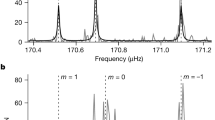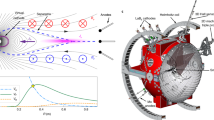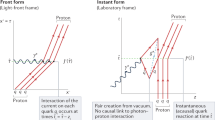Abstract
PROF. P. M. S. BLACKETT1 has recently directed attention to the well-known, but forgotten, fact that the ratio of magnetic moment &Pvec; and angular momentum &Uvec; is roughly the same for the sun and for the earth and can be written in the form, Here G is the gravitational constant, c the velocity of light and β a dimensionless constant of the order of unity, which Blackett estimates to be 0·130 for the earth and 1·14 for the sun. Furthermore, from Babcock‘s measurements Blackett deduces the value β = 1·16 for the star 78 Virginis, but since the mass, radius and angular velocity are all deduced statistically in this last case and the sign is unknown, only little weight can be attached to it.
This is a preview of subscription content, access via your institution
Access options
Subscribe to this journal
Receive 51 print issues and online access
$199.00 per year
only $3.90 per issue
Buy this article
- Purchase on Springer Link
- Instant access to full article PDF
Prices may be subject to local taxes which are calculated during checkout
Similar content being viewed by others
References
Blackett, Nature, 159, 658 (1947).
Cf. also the theory of Pauli, Ann. Phys., 18, 337 (1933), especially p. 372 where G1/2/c occurs in connexion with h.
See, for example, Barnett, Rev. Mod. Phys., 7, 129 (1935).
Author information
Authors and Affiliations
Rights and permissions
About this article
Cite this article
ARLEY, N. Blackett‘s Hypothesis of the Magnetic Field of Rotating Bodies. Nature 161, 598–599 (1948). https://doi.org/10.1038/161598a0
Issue Date:
DOI: https://doi.org/10.1038/161598a0
Comments
By submitting a comment you agree to abide by our Terms and Community Guidelines. If you find something abusive or that does not comply with our terms or guidelines please flag it as inappropriate.



